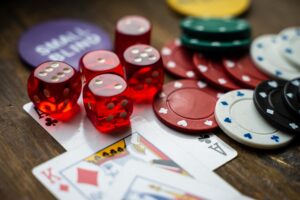The Psychology of Risk-Taking: Why do we gamble?

Studying the psychology of gambling is a challenging subject. When they walk into a casino, gamblers have wildly different motivations. Because of the extreme differences between healthy and unhealthy gamblers, both groups of gamblers must be analysed in any study of the mentalities of bettors.
Numerous research teams have studied casino gamblers scientifically over the last 20 years. With the use of behavioural and neurological analysis, these scientists have identified specific mental processes that result in problematic behaviour.
In order to examine gambling psychology, a number of fundamental questions need to be addressed. We will discuss each of the following topics in this article.
Why Do We Gamble?
Gambling is fundamentally a paradoxical behaviour since, as most of us are aware, “the house always wins.” It makes no difference how you play the roulette table or how you pull the levers on a slot machine—the odds are always carefully calculated to make sure the casino turns a profit. Therefore, why do people gamble when there is a high probability of financial loss?
Let’s examine gambling psychology in more detail to learn what motivates people to begin and keep gambling even when it is harmful to them.
What Does Gambling Do to Our Brains?
Gambling offers potential benefits to the brain in addition to dopamine release, such as enjoyment, money, and social interaction. While the majority of us can turn away from the game and adopt safer gambling practices when we lose, some people—a phenomenon known as “chasing losses”—may keep playing in an attempt to win back the money they have lost. These people might start to experience gambling issues.
Brain Connections has done research on the evolution of gambling from a fun hobby to an addiction. Problem gambling modifies the brain’s rewards system, leading to the formation of new, difficult-to-break habits. Someone may feel out of control as a result of this.
All of the previously mentioned justifications for gambling lead to this conclusion: most people view gambling as a low-risk, high-reward endeavour. It’s actually the exact opposite: a low-yield, high-risk scenario. Always, the house has the better odds. Nevertheless, regardless of the likelihood, the excitement and anticipation of winning a casino jackpot are frequently too irresistible.
Not All Gamblers Are Irresponsible
All bettors should and can practise safer gambling; it’s not just a topic for those who know or suspect they have a gambling problem. As they say, “prevention is better than cure,” so keeping a positive relationship with gambling requires careful consideration of how much, when, and how much you should bet. While there are many tactics that banks and bookmakers have developed to assist you in doing this, they all come down to self-control.
Gambling has a toxic image, but when self-control is implemented on UK casino sites reviewed and ranked from Gambling.com long-term complications can be avoided.
Following the Crowd & Fallacies
There is a ticket-buying frenzy when lottery jackpots hit record highs and receive a lot of media attention because people feel they must be involved in the process. Even those who have never played the lotto before will “jump on the bandwagon” and buy some tickets during these periods.
False beliefs also impact a gambler’s mental state. When seven consecutive black numbers appear in a row, for instance, a roulette player watches and decides to wager all of his money on red. The widely recognised psychological phenomenon known as the gambler’s fallacy refers to the erroneous notion that an event is about to occur if it occurs repeatedly. Actually, the chances of any given event happening are always the same as what the odds imply.
The Chasing Losses Phenomenon
Dopamine is released in brain regions that are activated in a manner comparable to that observed when substances are abused, according to studies. Indeed, akin to substances that induce addiction, prolonged exposure to gambling and ambiguity modifies the structure of the human brain. These reward pathways, which resemble those observed in individuals afflicted with substance addiction, exhibit heightened sensitivity. According to animal studies, these alterations in the brain caused by uncertainty may even increase the desire and cravings of gamblers for addictive substances.
Uncertainty and repeated exposure to wagering can even alter one’s reaction to defeat. Contrary to expectations, individuals grappling with a wagering addiction experience a similar level of dopamine release from losing money as they do from winning. As a consequence, problem gamblers experience a phenomenon known as “chasing losses,” in which the desire to continue playing is triggered by defeat rather than the disappointment that might otherwise cause them to withdraw.
The proliferation of electronic gambling machines has also resulted in the programming of potential outcomes onto a set of virtual reels, as opposed to being limited by the physical configuration of these outcomes on individual reels. Therefore, game designers have the ability to arrange the deck in order to increase the frequency of specific events.
This encompasses instances of near-misses in which a reel narrowly fails to align with a potential windfall. Particularly in the case of problem gamblers, these near-miss almost-wins stimulate regions of the brain that ordinarily react to wins and increase the desire to play further.
Final Thoughts
In summary, wagering transcends mere chance and good fortune; it is intricately linked with the intricacies of human psychology. The dynamic interaction of risk, reward, mental preconceptions, and emotional shifts can contribute to the intricate and captivating nature of wagering.
It is imperative to acknowledge these psychological dimensions for both responsible gamblers and those who may be susceptible to developing issues associated with wagering. A positive connection with this form of entertainment can only be maintained by approaching it with prudence, comprehension, and awareness





